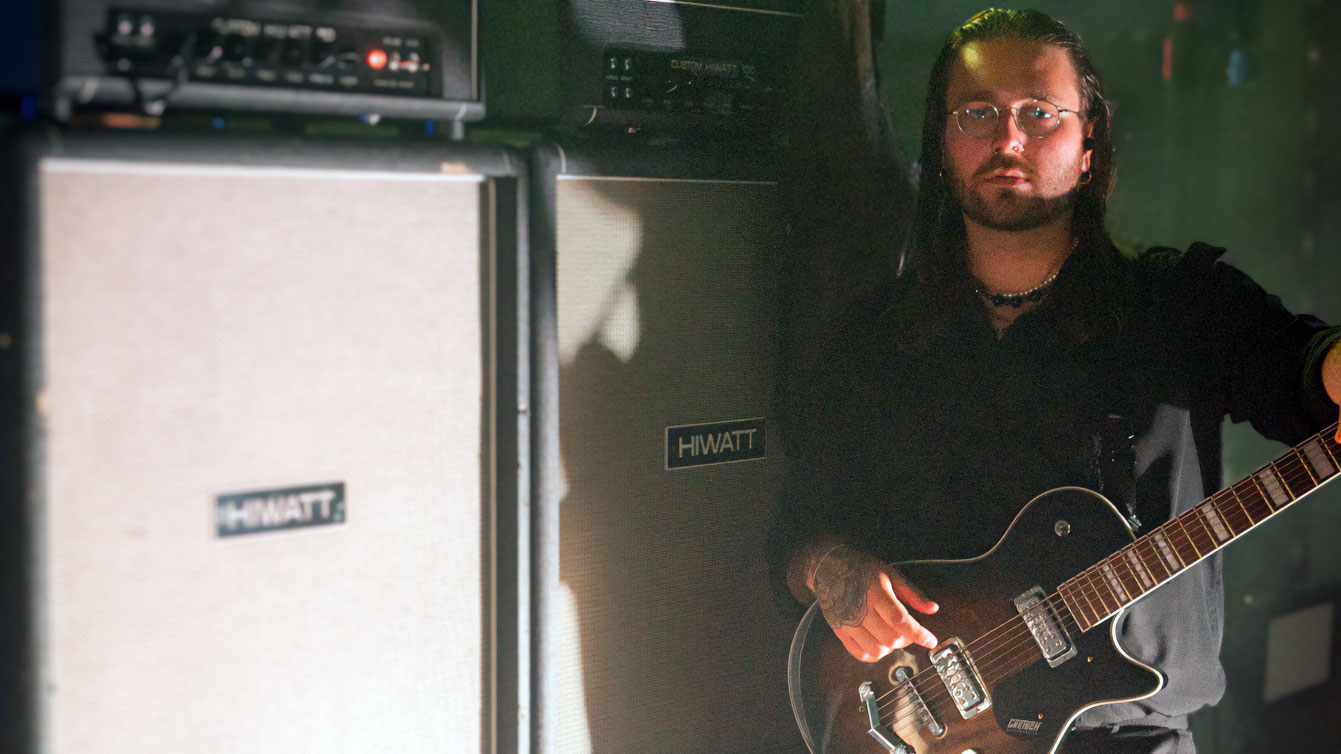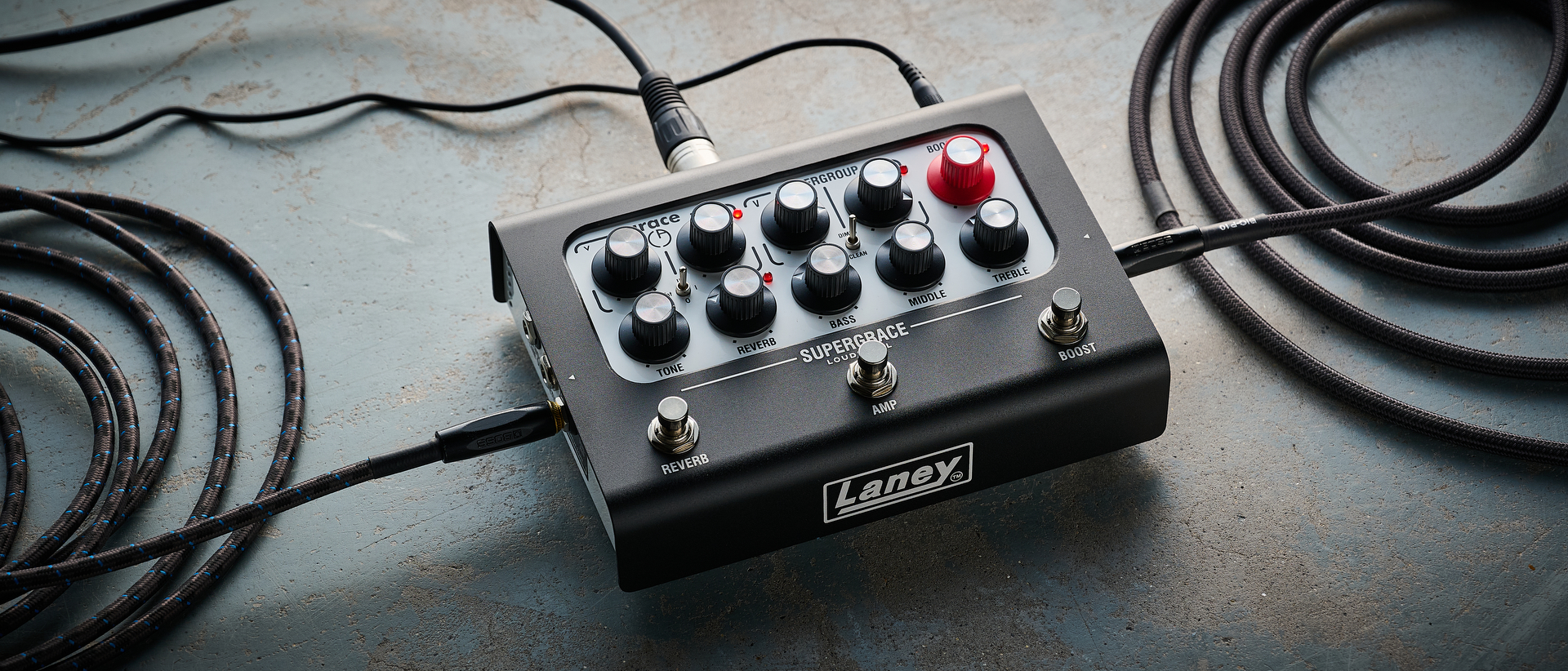“When I was younger, I wanted the most expensive stuff… But there’s more character in the player than the equipment”: Loathe’s Erik Bickerstaffe on conjuring impossibly heavy riffs with a Gretsch baritone, Behringer multi-FX and some serious down-tuning
While finishing up the djent-shoegaze heavyweights’ new album, Bickerstaffe reflects on kickstarting a craze for baritones, why he’s burned out on P-90s, and what makes amp modelers feel like a step backward

All the latest guitar news, interviews, lessons, reviews, deals and more, direct to your inbox!
You are now subscribed
Your newsletter sign-up was successful
Few modern guitar players have left bruises as heavy as Loathe’s Erik Bickerstaffe. Since bursting onto the scene in 2016, he has almost single-handedly caused the price of Squier Vintage Modified Baritone Jazzmasters to triple in price on the second-hand market by conjuring earth-shattering sounds from his.
Today he continues to champion cheap budget gear despite the band’s success. “When I was younger, I wanted the most expensive stuff, because of the idea that you get what you pay for,” he says.
“But there’s more character in the player than there is in the equipment. Nothing is outright bad; everything has its own home that it just needs to find. For me, any sense of, ‘Oh, it’s not Fender!’ dissolved very quickly. What matters is the music.
Bickerstaffe continues: “Sometimes cooler music is made on whatever. There are so many musicians in bedrooms making amazing sounding records – you don’t need a huge amp stack or a $1,000 guitar.
“I still have a Behringer multi-effects pedal on my board, which I use for delays and crazy sounds. My aunt got it for £30 years and years ago. It was my first-ever pedal and I’m still using it to this day. It is dying a bit, though!”
Equal parts heavy djent extroverts and shoegazing introverts, many have called Loathe’s blending of styles inspired. Bickerstaffe is speaking to Guitar World from Peter Gabriel’s Real World Studios in Bath, UK, as he completes tracking on the band’s next barrage of riffs for the follow-up to 2021 album I Let It in and It Took Everything.
Having originally played a seven-string ESP LTD SCT-607B, the jump to baritone was more about avoiding preconceptions rather than tone. “I guess the first thing was aesthetic,” he says. “I prefer the look of a six-string guitar – extended-range guitars really send the idea of the music you’re about to hear in a certain direction.
All the latest guitar news, interviews, lessons, reviews, deals and more, direct to your inbox!
“I felt like the only thing I’d get out of a seven-string was more notes; but at the same time, I felt those notes could be better implemented in different areas to fill out space and give a bit more depth to the music.”
Loathe drummer Sean Radcliffe – also a guitarist – suggested Bickerstaffe should try out a baritone “because The Beatles played one”. He soon moved from a Squier Bass VI to his value-hiking and P-90-loaded Jazzmaster. He’s described it as the best guitar he owns, even if it’s not currently his primary weapon.
“A Gretsch rep came to one of our shows,” he remembers. “At the time I didn’t realize Fender owns Gretsch. I really wanted to keep playing the Jazzmaster and develop a relationship with Fender. So when Gretsch came along I was like, ‘Oh man, it’s not Fender.’”
When the penny dropped, a G5260 Electromatic Jet baritone landed in his hands; and recently it became the first guitar he’s ever modded. “I've always got a new guitar and been like, ‘Cool, this is what I use now,’” he says.
I can only afford to take one guitar on tour, so it needs to be able to withstand all the tuning that we do. The .105 is a necessity for stability
“Only recently have I tried exchanging pickups for another set. Thankfully our guitar tech, Ryan, makes his own pickups so he offered to make me some.
“I wanted the Gretsch feel more like a really thick, Les Paul rock guitar. I said the mini-humbuckers were a little bit fluffy and I wanted something a bit more square-sounding. Then he went and made them, and they sound fantastic. It’s interesting to play the same guitar and get a new sound, so it might be something I get into exploring more.”
Another inspiration for Bickerstaffe’s new tonal exploration has come via his latest baritone, a custom-built gift from Liverpool’s Lothario Guitars. “It’s a 29-inch scale and it’s really good,” he says.
“It’s got a walnut body and top with a purple heart fretboard and neck. It’s the first baritone I’ve had with actual humbuckers, so I’ve never had a guitar-sounding baritone.”
The newfound love for that humbucker sound comes after Bickerstaffe became a victim of his own success. “I feel a little bit burned out over the sound of P-90s now,” he admits. “They’re very spanky, but they have a very particular sound. A lot of people have realised you can chug them and get a result, so I think they’ve become a bit overused.”
There’s still plenty of experimentation going on when it comes to string gauges, with onstage practicality playing a big part. His two main tunings are A E A E D F# and A D A D G B, which are disgustingly low – producer George Lever has said it “sounds like what happens if you add distortion to the cable that holds up a bridge”.
A post shared by Erik Bickerstaffe (@kirestaf)
A photo posted by on
“I’ve always preferred thicker strings because I’m also a drummer,” Bickerstaffe explains. “I depend on the impact and attack when I hit the string; I don’t want it to be biting back at me. When you hit a drum it doesn’t move.”
He adds: “Obviously thicker strings are a lot duller, but I’m using a .105 on my bottom E because I also need it to go down to B (an octave below a seven-string) during the set.
We’re all just grateful to be a part of anyone’s musical journey. That’s what Periphery did for me
“I can only afford to take one guitar on tour, so it needs to be able to withstand all the tuning that we do. The .105 is a necessity for stability. We all know that thinner strings sound better for attack – but it’s a give-and-take.”
As a songwriter, he aims to give every song he writes “a unique character.” He’s an advocate of replicating those characteristics live. But that’s changing: “I’ve fallen in love with the concept of, ‘This is what the band sounds like live.’”
It’s an affair that’s come about in part by circumstance. While he’d love to have multiple amps on stage, Loathe have to be practical, which means his Hiwatt DR504 and Marshall JCM800 are left at home in favor of a streamlined rig with an Axe-Fx II at its core.
“There’s a lot of capability,” he says. “But I’ll always prefer the feel of a real amp, and they look so much better on stage. So it feels like we’ve kind of taken a step back, even though it’s such an advance in musical technology.”
Along with from a Boss TU-3 tuner and the oddball delays of his Behringer, there are five more weapons on the pedalboard that completes his live rig. He prefers the tone of a DigiTech Whammy to the Axe-Fx’s in-built pitch-shifting “because it’s going through electronics and doing its own thing.”
He uses EarthQuaker Devices’ Rainbow Machine for weird, nightmarish sounds. And in keeping with his budget gear love-in, he has a Boss HM-2 distortion pedal which he steps on for “crazy feedback” on demand.
His latest purchase is a DigiTech Space Station, which he got on the second hand market. He is, however, “dubious about bringing it on tour because it's old and expensive” – although he’s sure that’ll change in due course.
Having convinced countless players to buy baritones and tune them hellishly low, Bickerstaffe isn’t taking Loathe’s influence lightly. “It's an extreme privilege to be regarded as an inspiration,” he says.
“It also comes with a lot of stress – ‘Fucking hell, we’ve gotta live up to this thing’ – but it keeps us on our toes. We’re all just grateful to be a part of anyone’s musical journey. That’s what Periphery did for me; and if we’re doing that for others, then that’s a beautiful thing.”
- Loathe are on tour in the US. See loatheasone.co.uk for full dates.
A freelance writer with a penchant for music that gets weird, Phil is a regular contributor to Prog, Guitar World, and Total Guitar magazines and is especially keen on shining a light on unknown artists. Outside of the journalism realm, you can find him writing angular riffs in progressive metal band, Prognosis, in which he slings an 8-string Strandberg Boden Original, churning that low string through a variety of tunings. He's also a published author and is currently penning his debut novel which chucks fantasy, mythology and humanity into a great big melting pot.




